Ever wanted to know more about where and who you came from? Now’s your chance with RootsMOOC, a free online genealogy and family history class offered through the State Library of North Carolina. The class officially starts this week but enrollment is ongoing during the course’s March 23-June 1 duration. Every two weeks a new module will be available but late registrants can go back and revisit previous modules.
The class is ‘a friendly introduction to family history research in the U.S. using commonly available sources,’ explains the State Library’s Government and Heritage Library Blog. ‘The staff at the State Library of North Carolina’s Government and Heritage Library will help you learn about the most useful sources, tools, and techniques for getting your research off the ground. By the time you’re finished with this course, you’ll have a good start on your own genealogy research and you will know how and where to keep digging.’
To take the class, sign up here
Read the full release here:
Discover Your Family’s Roots with RootsMOOC from the State Library of North Carolina
RALEIGH, N.C. — More than 3,000 citizens from around the state, across the U.S. and beyond have registered for the free introduction to genealogy and family history course, RootsMOOC. The online class through State Library of North Carolina went live this week. Enrollment is ongoing during the March 23-June 1 class.
Many universities and educational institutions are developing Massive Online Open Courses (MOOCs) that are non-credit and free to the public. RootsMOOC is a partnership of the State Library of North Carolina and the Z. Smith Reynolds Library at Wake Forest University.
Staff at the Government and Heritage Library will help you get off to a good start in genealogy research with RootsMOOC, and will help you know how to continue digging when the course ends. RootsMOOC incorporates the most useful sources, tools and techniques for researchers.
The program consists of five two week modules and there are no deadlines or set meeting times. Discussions will be open through June 1. Modules remain open and researchers can go back to earlier modules if they choose. Modules include:
Introduction and Orientation
Getting Started and Staying Organized
Tapping into the U.S. Census
Using State and Local Resources (local history room, public library, university archives, state library and archives, etc.)
Understanding and using Digital Collections
Participants will complete an ancestor chart, conduct interviews with relatives and share progress with fellow participants. You’ll be challenged to go beyond online resources, identify local genealogy societies and libraries in your area, and connect with experts that can help you wherever your search leads.Created by Wake Forest University’s Z. Smith Reynolds Library and the State Library of North Carolina, this project was made possible in part by a grant from the Institute of Museum and Library Services.
Sign up at https://www.canvas.net/browse/reynoldslibrary/courses/intro-to-genealogy
For additional information, please call (919) 807-7450. The Government and Heritage Library in the State Library is within the N.C. Department of Cultural Resources.
About the North Carolina Department of Cultural Resources
The N.C. Department of Cultural Resources (NCDCR) is the state agency with a vision to be the leader in using the state’s cultural resources to build the social, cultural, educational and economic future of North Carolina. Led by Secretary Susan Kluttz, NCDCR’s mission is improve our state’s quality of life by creating opportunities that promote economic development, stimulate learning, preserve the state’s history and spark creativity to experience excellence in the arts, history and libraries in North Carolina. NCDCR was the first state organization in the nation to include all agencies for arts and culture under one umbrella.Through arts efforts led by the N.C. Arts Council, the N.C. Symphony and the N.C. Museum of Art, NCDCR offers the opportunity for enriching arts education for young and old alike and spurring the economic stimulus engine for our state’s communities. NCDCR’s Divisions of State Archives, Historical Resources, State Historic Sites and State History Museums preserve, document and interpret North Carolina’s rich cultural heritage to offer experiences of learning and reflection. NCDCR’s State Library of North Carolina is the principal library of state government and builds the capacity of all libraries in our state to develop and to offer access to educational resources through traditional and online collections including genealogy and resources for people who are blind and have physical disabilities.
NCDCR annually serves more than 19 million people through its 27 historic sites, seven history museums, two art museums, the nation’s first state-supported Symphony Orchestra, the State Library, the N.C. Arts Council and the State Archives. NCDCR champions our state’s creative industry that accounts for more than 300,000 jobs and generates nearly $18.5 billion in revenues. For more information, please call (919) 807-7300 or visit ncdcr.go




Before you comment
The comments section is here to provide a platform for civil dialogue on the issues we face together as a local community. Xpress is committed to offering this platform for all voices, but when the tone of the discussion gets nasty or strays off topic, we believe many people choose not to participate. Xpress editors are determined to moderate comments to ensure a constructive interchange is maintained. All comments judged not to be in keeping with the spirit of civil discourse will be removed and repeat violators will be banned. See here for our terms of service. Thank you for being part of this effort to promote respectful discussion.